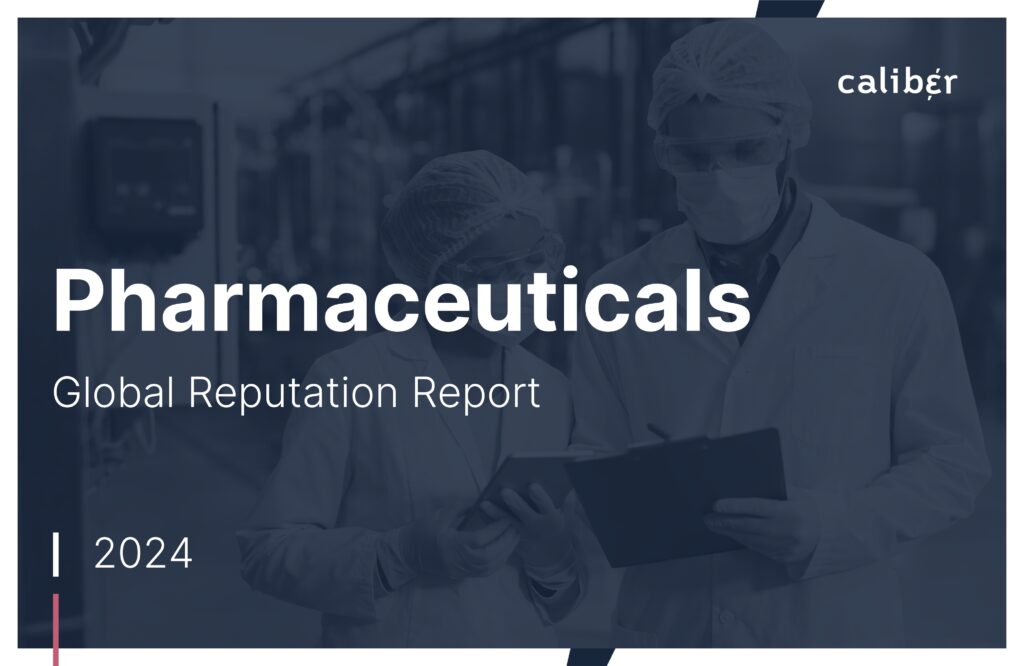COPENHAGEN, DENMARK. July 1st, 2024 – Roche has topped a poll of the world’s most “trusted and liked” pharmaceutical companies, followed by Swiss rivals Novartis and British firm GSK, according to a reputation report released today by Caliber, a stakeholder intelligence company in Copenhagen.
Caliber’s poll was based on more than 30,000 ratings of the world’s 34 largest pharma companies by market capitalization across 13 markets. Pfizer had the fourth-best reputation, followed by Johnson & Johnson, Moderna and AstraZeneca.
Notably, several companies failed to clear Caliber’s “15% familiarity” threshold, meaning they had to be excluded from the ranking. They included Novo Nordisk (only 14% of respondents were familiar with them), Eli Lilly (9%) and Merck (7%).
Heavy topic
Caliber also surveyed almost 16,000 people worldwide about weight-loss drugs such as Wegovy and Zepbound — revealing that 53% of respondents think they’re a “quick fix”, a figure that rises to 63% in both the UK and the US.
Meanwhile, 53% of people say they see obesity as “mainly caused by lifestyle choices”, while one in five (19%) say it’s “mainly caused by genetic factors”. When asked about the underlying factors of obesity, 70% of respondents point to the “excess intake of calories, fats and sugar”, while almost two-thirds (64%) say “a lack of physical activity”.
Perplexing perceptions
Caliber’s report also examines perceptions of companies associated with weight-loss drugs. It shows that less than a quarter of people worldwide (22%) think pharmaceutical companies such as Novo Nordisk and Eli Lilly are “helping solve a global health crisis”, while 12 percent think they’re “taking advantage” of the crisis.
In addition, the report reveals uncertainty about which companies make weight-loss drugs. When asked which ones are “associated” with them, only 20% of people picked Wegovy producer Novo Nordisk, while just 12% of respondents picked Eli Lilly, which produces the blockbuster weight-loss drug Zepbound. One in five people chose Pfizer, and 17% selected AstraZeneca — neither of which has a weight-loss drug on the market yet.
“These results suggest the pharmaceutical sector needs to better educate the public about the causes of obesity, from employing evidence-based arguments for the role of genetic markers to explaining how weight-loss drugs aren’t a quick fix but instead help patients get to the point where they can more easily make lifestyle changes that can sustain their weight loss such as improving their diet,” says Caliber CEO Shahar Silbershatz.
“It’s also interesting that the two companies that don’t yet have a product on the market are relatively well associated with weight-loss drugs, while the two that do are flying under the radar,” says Silbershatz. “Ordinarily, companies entering a market later can learn from others’ mistakes, but Pfizer and AstraZeneca are effectively in the game already — which suggests they need to help the sector win the narrative sooner rather than later.”
Reduced-strength reputation
Finally, Caliber’s report provides a snapshot of the pharmaceutical sector’s reputation. It shows that perceptions have fallen since Caliber’s previous sector survey in February 2023. For the companies included in the survey, the average Trust & Like Score — Caliber’s chief measurement of corporate reputation — fell two points (to 65 out of 100). Their average Integrity and Inspiration scores also fell. Just one reputational attribute — Innovation — got a “High” score on Caliber’s scale. All others got “Average” scores.
The report showed a similar pattern to measurements of likely stakeholder behavior. Compared to the 2023 results, respondents were slightly less likely to say something positive about the pharma sector or consider looking for a job in the industry but slightly more likely to consider buying pharmaceutical products or services.

